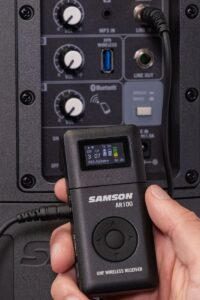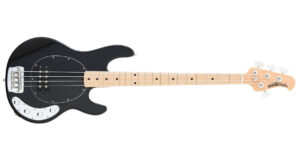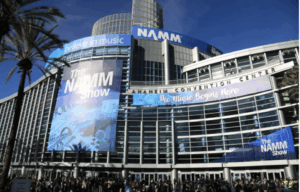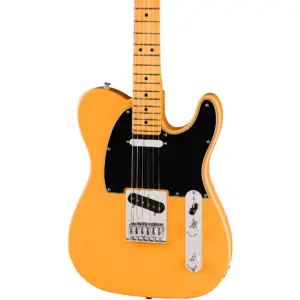Who snags a Grammy nomination for their debut album, written and recorded live in twelve days in a Brooklyn church? Mumbai-born, New York-based songstress Priya Darshini, that’s who.
Her debut album Periphery was nominated in the Best New Age Album category, a bit of news that hit her even before she’d had her morning coffee. Yet, Priya Darshini continues to approach music with the same grace that illuminates every song in Periphery, caressed by majestic strings, wistful dulcimer and effervescent vocals that shimmer between Indian classical with western influences.
Post the Grammys, she catches up with The Score Magazine to offer her impressions of a massive accomplishment, her artistic path and what inspires, motivates and enlightens her.
How has life changed (both artistic and otherwise) after your Grammy nomination?
While I remain deeply grateful for this immense recognition, I’m still on the same artistic journey. I continue to explore, and learn. If anything, this was an affirmation to trust my process. Professionally, many new doors and pathways have opened up, though things are still tentative and constantly changing as we navigate a tenuous time. This past year has had me reassessing my priorities, the intention behind my art, and how I define success.
Have you started thinking of yourself and your music differently after the nomination?
Why would that be the case? I continue to navigate this path as a student. A nomination shines light in that moment. Something I’m deeply grateful for. But then, onward. Much beautiful music is yet to be made, and to be discovered. Much growth is yet to happen.
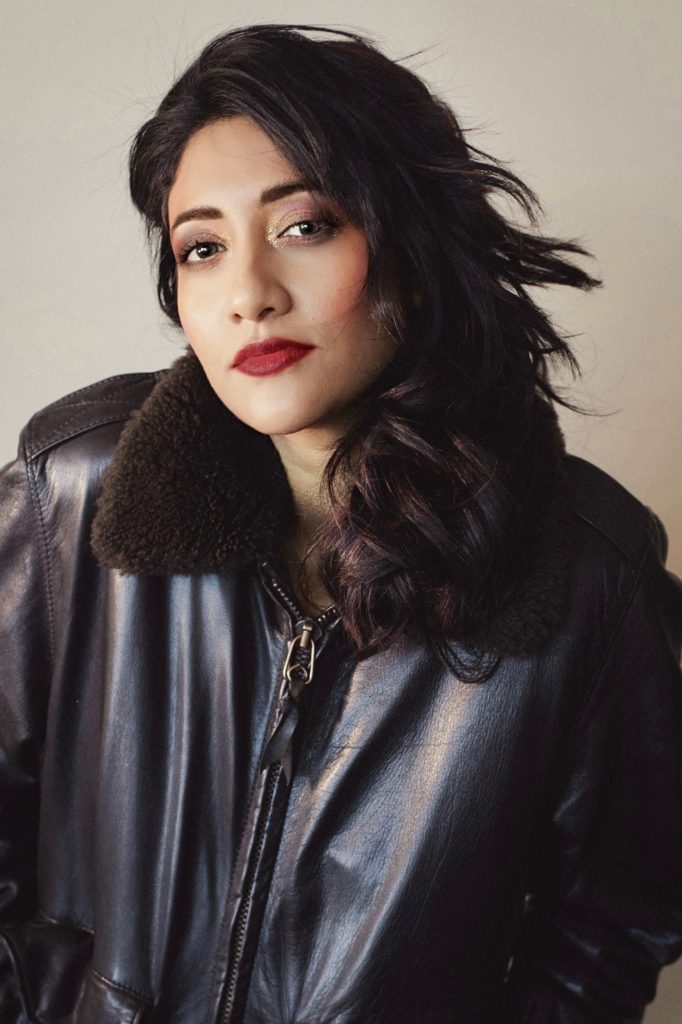
Your debut album grabbed a Grammy nomination. What, in your music, do you think resonates so deeply?
The album was recorded live, on one microphone in an abandoned /vacant church in Brooklyn. No EQ or compression was added. The intention was to bring in the embodied space and document a specific moment in time, a musical emergence bursting with energy and vulnerability.
We played around in real time, with how the architecture of the place responded to each of our instruments. We had twelve days to write all the music. A writing and recording process like this one can break you and make you whole, all at once.
We had to stay true and authentic to ourselves, be fearless, drop egos and function from a place of complete vulnerability and trust. Maybe that’s what people resonated with.
What, in your opinion, is your greatest artistic insecurity? How do you deal with it?
Never being good enough. I feel that dealing with it is a work of understanding ego and my relationship with it. It’s fascinating, and maybe a necessary part of the process.
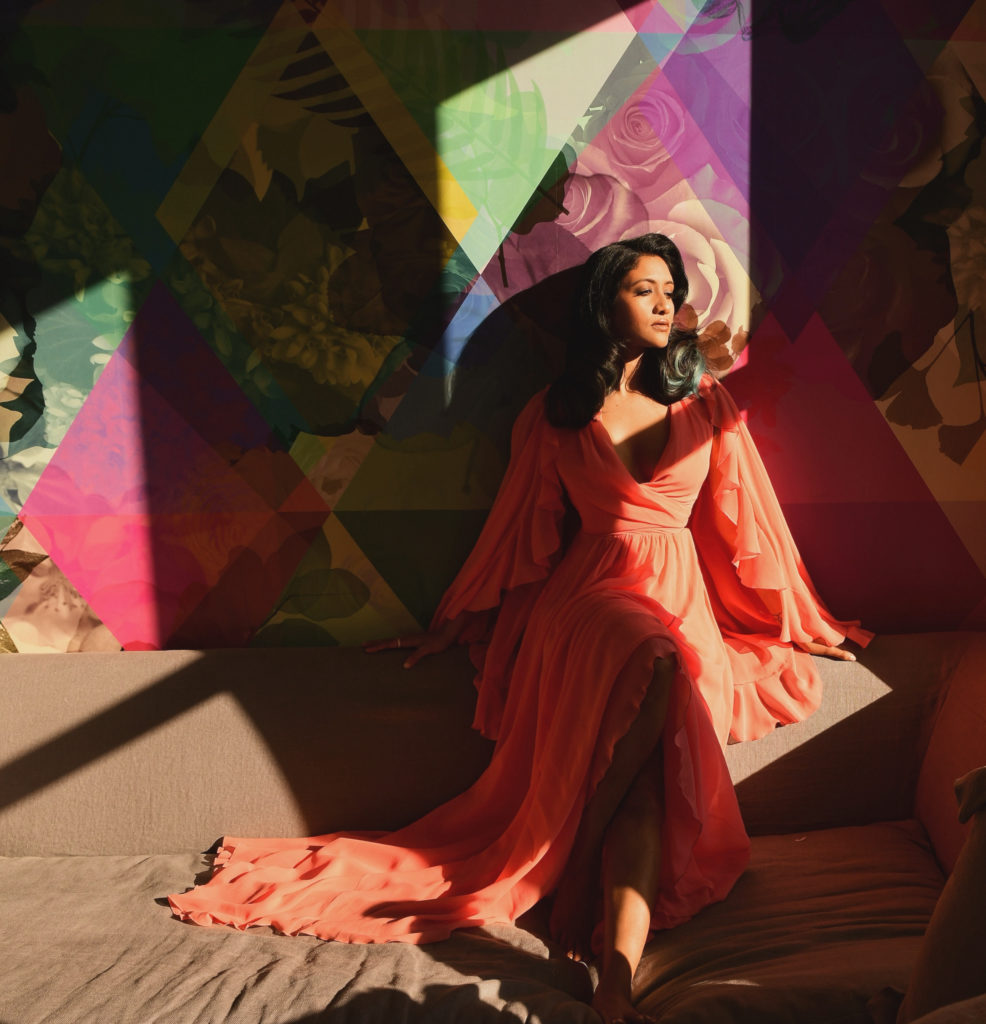
What have been your most painful struggles till date? What has made it hardest to get where you are?
I’d rather leave out the personal struggles for now, but professionally – losing my voice and having vocal cord surgeries, restarting my career and building my life up again from scratch in a new country, navigating a world that is systemically rooted in toxic patriarchy. This has been an isolating path.
That said, this past year makes me shift focus away from all of it, and towards the feeling of gratitude for this life, and the privileges I have been afforded.
What was the hardest part of making Periphery?
Writing and recording it. We had a limited time to write (about twelve days) and we did most of it virtually. The recording process was very challenging, yet fascinating.
Periphery was recorded using advanced HD recording technology by Chesky Records – where we recorded Live, on one mic, with no headphones, spread out far away from each other in a large space. But perhaps the internal work to bring all of myself fully in those moments was the most challenging part.
Who are your greatest teachers?
Nature, life’s experiences, people, my mentors, my teachers.
You’ve travelled from Hindustani classical training to jazz. Was this natural? Did you find any similarities that helped you make the transition?
When I first started singing or listening to jazz in India, I was just listening to it, but not experiencing it culturally, which is an integral part of the music.
Now living here has helped me immerse myself a little more in this music, and helps me have a deeper understanding of it. There are so many similarities, one of them being they both require improvisation within structures.
Tell us a bit about making Periphery – from concept to release. Where did you begin?
David Chesky (Founder of Chesky Records) saw me, Dave and Max perform at a fundraising event and reached out saying he would like to record with us in this iteration, adding a percussionist.
Due to the nature of this crazy recording setup, the recording date was already set, and it was to happen in two weeks. By the time we got to writing, we had twelve days left. I was in a challenging place at the time – trying to navigate my existence in two different worlds that I called home.
Given that the anti-immigrant rhetoric had been given new wings, the rising fear and hatred for anything that was different from us, compounded with the disconnect I was feeling from my friends and life back home in India – I felt on the periphery, and that’s where so much of this album comes from. That feeling of isolation and the need to connect with people who were feeling like me.
The recording took a whole day and we recorded in this gorgeous church in Brooklyn. We played two or three takes of each song and moved on to the next. Towards the end of the session, David Chesky requested we play Savare – Ravi Shankarji’s composition which most of the band was playing for the first time. The recording itself was a full twelve hour recording session.
For the rollout of the album, I worked with dear friends and people who I admire deeply. Lauren Delaquilla worked with me on designing the cover. And in India, I produced a music video for the single Home that was shot at Borivali National Park in Mumbai – directed by the awesome Megha Ramaswamy.
By the time I returned from India, the pandemic had hit the roof here in NYC. Everything went quiet. My album roll out plans had to be put aside. The album was released during the lockdown in NYC. It was quite an unusual and surreal experience to be putting it out at a time like that and not being able to tour with the music.
You are involved in myriad conservation efforts. Give us a little insight into that.
Currently, I’m on the board of International Wildlife Conservation Network (IWCN), and educating myself in sustainability, and circularity for an upcoming project related to conservation.
IWCN provides expert interdisciplinary assistance, training, collaboration, and shared research to enable communities around the globe to coexist with wildlife. We work with our partners on the ground from around the world, to provide co-existence solutions to peacefully resolve conflicts with wildlife.
Our interdisciplinary teams include scientists, agricultural managers, researchers, ethicists, economists, government specialists, educators, indigenous leaders, technical engineers and more who are helping to pioneer new ways to live peacefully in coexistence with our beautiful wildlife. You can find out more on wildlifecoexistence.org in the What’s new section.
Outside of music, what are your other creative pursuits?
I like to read, cook, learn and teach about the physiology of the voice. I like studying about biomimicry, sustainability, and circularity and finding ways to incorporate that in what I do.
Where do you get your ideas from?
My experiences, the arts, nature and silence.
If you had to recommend three albums to a completely alien civilization, what would they be?
Ahh tough one.
Toumani Diabaté and Ballaké Sissoko’s New Ancient Strings
Miles Davis’ Kind of Blue
any live performances by MS Subbalakshmi, and Ustad Bade Ali Khan Sahab.
How have you been enduring the pandemic and everything it has inflicted?
I’m just trying to keep my head above the ground , and adapt to the changes, just like everyone else. I’ve been trying to keep gratitude, and love at the center of it all. I’m focussing on mental health, offering healing in whatever way I can, and trying to find peace in music and the work I do.
While I’ve kept myself available to whoever needs me, I’ve been selective of the people I reach out to when I’m in a rough place. I’ve learned that it’s important to curate the kind of energy you surround yourself with.
What have you been up to since the nomination?
I’ve started working on my next album – my first studio album! I’ve been working on Covid relief work with my non profit in India – Jana Rakshita, and with IWCN.
I’ve got some cool new toys I’m working with – pedals and such. I continue to study with my teacher in India, and work on expanding my craft.
Where are you most comfortable? In the studio? In your home with family? On a hike?
– In nature.
What’s keeping you going right now?
Possibility. This incredible gift of life, and the people who are inspiring me to be better.
Do Follow
Instagram- https://www.instagram.com/priyism/?hl=en



